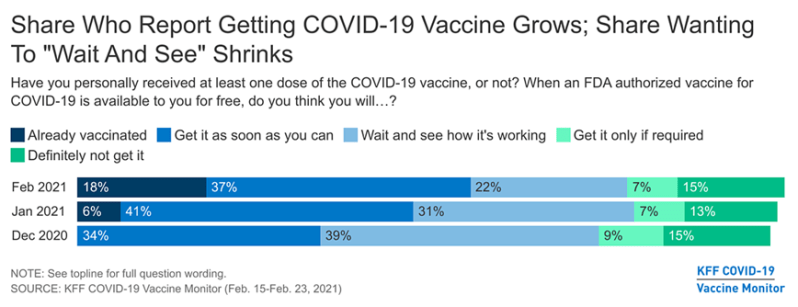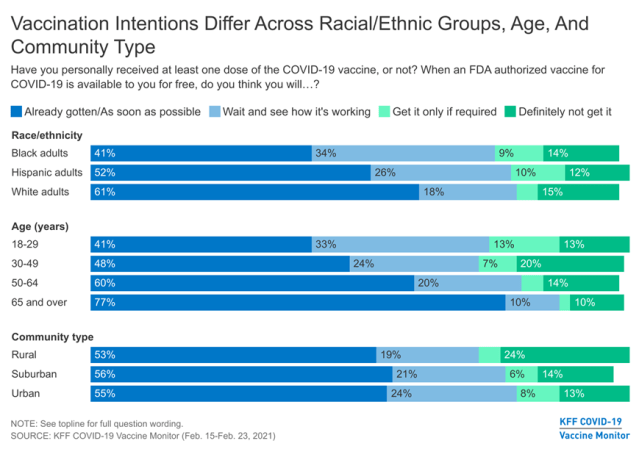
The independent source for health policy research, polling, and news.
Most Americans Now Say They’ve Gotten At Least One Dose of a COVID-19 Vaccine or Want to Get Vaccinated As Soon As Possible, with Enthusiasm Rising Across Racial, Ethnic and Partisan Groups
Black and Hispanic Adults and Those Under Age 30 Remain Most Likely to Want to “Wait and See;” Roughly One in Four Among “Wait and See” Say They Would Be More Likely to Get Vaccinated if Only One Shot Were Required
While Enthusiasm Rises, a Persistent Minority Say They Definitely Will Not Get Vaccinated; Republicans, Rural Residents, and Essential Workers Outside Health Care Are Most Reluctant Groups
More than half of Americans (55%) now say they want to get vaccinated as soon as possible (37%) or have already received at least one dose (18%), up 8 percentage points over the past month as more people have gotten at least an initial vaccine dose, the latest KFF COVID-19 Vaccine Monitor reports.
An additional 1 in 5 (22%) are open to getting a vaccine but want to “wait until it has been available for a while to see how it is working for others,” down from 31% a month ago as more people have gotten vaccinated.
“We’re seeing more Americans who want to get vaccinated, but Black, Hispanic and rural Americans will be left behind unless special efforts are made to increase vaccine confidence in those communities,” KFF President and CEO Drew Altman said.
The latest report shows that all demographic groups are seeing an increase in the share who have already been or want to get vaccinated as soon as possible, though eagerness varies substantially.
People ages 65 and over (44% vaccinated, 33% as soon as they can) and Democrats (23% vaccinated, 52% as soon as they can) are the most eager. Black adults and young adults under age 30 are most likely to say they want to “wait and see” before getting vaccinated, with a third of each group describing themselves that way, along with a quarter (26%) of Hispanic adults.
While the two COVID-19 vaccines currently being used involve two doses, a third may soon be available that would require just one dose. About a quarter (26%) of those who want to “wait and see” say they would be more likely to get vaccinated if it required only a single shot.
About 1 in 5 (22%) are more reluctant about getting vaccinated, including 7% who say they would do so “only if required” for work, school or other activities, and 15% who say they definitely will not get vaccinated. The most reluctant groups include Republicans, essential workers who work outside health care, and people living in rural areas.
The overall size of this reluctant group is little changed since December, suggesting they are less influenced by news and others’ experiences than those in the “wait and see” camp.
Side Effects Remain People’s Biggest Concern, Though Some Worry about Financial Costs
Side effects remain people’s biggest concern – most (56%) of those who have not been vaccinated, including 80% of those in the “wait and see” group, are concerned they might experience serious side effects from the vaccine.
About a third of those who have not been vaccinated also say they are concerned about potentially having to pay out of pocket for the vaccine (35%), missing work because of side effects (34%), or getting COVID-19 from the vaccine (33%).
Each of these concerns is more prevalent among the “wait and see” group, including at least half of Black and Hispanic adults in this group who say they are concerned about getting COVID from the vaccine (61% and 67%, respectively), missing work due to side effects (58% and 66%), or having to pay out of pocket (50% and 61%).
In addition, about half (52%) of Black adults and 58% of Hispanic adults in the “wait and see” group are concerned they won’t be able to get the vaccine from a place they trust.
Among people who have not yet been vaccinated, those with a household member (69%) or a close friend or family member (49%) who has already gotten vaccinated are more likely to say they want the vaccine as soon as possible than those who only know an acquaintance (33%) or don’t know anyone who has gotten the vaccine (36%).
Many Black and Hispanic Adults Lack Confidence Vaccines Were Adequately Tested In Their Groups
The Vaccine Monitor also gauges how Black and Hispanic adults view the vaccines’ development and whether they were tested adequately for safety and effectiveness among people like them.
Half of Black adults say they are not confident that the COVID-19 vaccines were adequately tested among Black people, and one-third of Hispanic adults lack confidence in the testing among Hispanic people.
Confidence about the testing process is related to people’s eagerness to get vaccinated. Compared to their less confident peers, Black and Hispanic adults who are confident that the vaccine has been adequately tested among their own racial or ethnic group are about twice as likely to say they’ve already been vaccinated or want the vaccine as soon as possible.
Designed and analyzed by public opinion researchers at KFF, the KFF Vaccine Monitor survey was conducted from Feb.15-23 among a nationally representative random digit dial telephone sample of 1,874 adults, including oversamples of adults who are Black (507) or Hispanic (506). Interviews were conducted in English and Spanish by landline (339) and cell phone (1,535). The margin of sampling error is plus or minus 3 percentage points for the full sample. For results based on subgroups, the margin of sampling error may be higher.
The KFF COVID-19 Vaccine Monitor is an ongoing research project tracking the public’s attitudes and experiences with COVID-19 vaccinations. Using a combination of surveys and qualitative research, this project tracks the dynamic nature of public opinion as vaccine development and distribution unfold, including vaccine confidence and acceptance, information needs, trusted messengers and messages, as well as the public’s experiences with vaccination.

